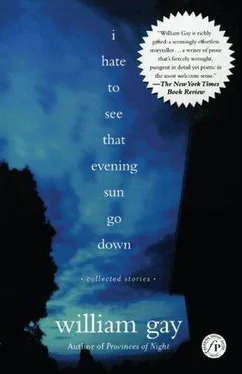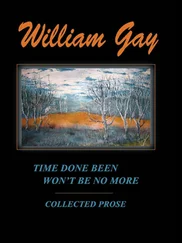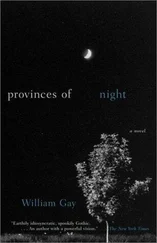In his youth Tidewater had courted violence like a lover but these years he wanted it out of his life, scalpeled cleanly out of his body and the clean living flesh cauterized by fire. He owned sixtyfive acres and a lot of fences and a century-old farmhouse. He renovated the farmhouse and converted a screened-in porch to a studio where he painted and these years he hardly left it. His hair grew long, the ends turned up loosely on his shoulders. The soft blond beard that covered his cheeks made him look ascetic and intense as a devout young monk, photographs taken of him during this period in Tidewater’s life looked like photographs of Jesus, if Jesus had ever taken the time to have his picture made.
Yet if the farm was an island of calm, disorder flourished beyond its borders, chaos lapped constantly at its shores.
He had once been far back in the woods, carrying a sketchpad and pencil, headed for a grove of beeches he wanted to paint. Halfway across a barbed-wire fence a voice out of the trees hailed him.
Hey.
Hey, Tidewater said. He climbed down the fence.
A man came out of the bracken with an unbreeched shotgun in the crook of his arm and a brace of squirrels strung on his belt.
Did you not see that sign? the man asked.
What sign?
That sign that said, trespassers will be shot, survivors will be prosecuted. Did you not see that?
No. No such sign existed but Tidewater did not say so. He waited.
What are you? Some kind of goddamned hippie, livin off the government?
I don’t live off anybody. I work.
You work? You look like a wild man to me, like you run wild in the woods for a livin.
I’m a painter, Tidewater said.
The man was half a head shorter than Tidewater and fully twenty-five pounds lighter but there was an outsized belligerence about him, as if he perpetually needed more space than he had been allotted, as if he’d suck a room dry of oxygen just by entering it. He hit Tidewater on the muscle of the arm, not lightly, a solid blow. He struck again, in measured insistence, like someone knocking at a door that just won’t open.
Suddenly he dropped the shotgun and shoved Tidewater hard and hit him while he was off balance. Tidewater slung the sketchpad and went backpedaling away and fell on his back in the dry leaves with the man astride him. He was trying to cover his face and the man kept slapping him, not hard, just contemptuously flicking his face.
Say I’m sorry I trespassed on posted land, the man said out of clenched teeth.
Tidewater had a crazy urge to laugh. What?
Say it goddamn you, or I’ll pound your head into the ground.
All right, Tidewater said, not lying, I’m sorry I trespassed on posted land.
The man seemed dissatisfied, perhaps with Tidewater s inflection. His grip tightened. Say I’m sorry I trespassed on posted land and I promise never to do it again, he said.
Oh for Christ’s sake, Tidewater said. You don’t know when to quit, do you?
He began to strain against the man’s weight, the arms pinning him seemed banded by iron but little by little he began to rise, the man pushing as hard as he could and his arms trembling and cords standing out in his throat but being lifted inexorably upright, his face congested and his eyes going crossed and peculiar.
Tidewater threw him aside and grasped up a windfall tree branch and began to whip the man with it. The man cursed and flailed both-handed at the branch then tried to crawl out of its reach, Tidewater following beating him until the man was crazed with sweat and leaves and squirrel blood.
Tidewater threw the branch across him. The man was cringing away in something akin to horror. Who the hell are you? he cried.
Tidewater was sick at heart at what he’d done. He’d firebombed his good intentions back to ground zero and so had to begin again. He took up the fallen shotgun by the barrel and slammed it against a tree trunk. The stock shattered.
I’m The Lightpainter, you son of a bitch; he wanted to scream, needing some trademark with which to mark the folks he beat up like the Z of Zorro’s rapier. Perhaps he’d have cards printed up and leave them stapled to the foreheads of the victims of his wrath.
IN TRUTH HE WAS the light painter. In the years when Lisa and Jenny had been children he had painted while Claire worked. She was an accountant and the money she earned balancing folks’ books and preparing their income tax returns made their living while Tidewater painted. He painted one picture after another that no one wanted. He’d paint and frame all year then in the fall load up the van to its ceiling with paintings and make a circuit of the craft shows and art fairs throughout rural Tennessee.
Then one year he’d painted a picture so perfect he felt he could not have done it. Perhaps he’d dozed and elves had completed it while he slept. It was a picture of a hay cart loaded with straw in the hall of a barn. A pitchfork, rude farm implements, leaned against it. But what was perfect was the light. He had caught the quality of indirect light perfectly, soft diffuse dust-moted light that fell through a high gable window, the harsher sunlight falling on the earth past the hall of the barn, each blade of straw on the cart imbued with soft gold light.
He was drunk on the power to re-create light on canvas. He painted one picture after another in an orgy of creativity. Bucolic pictures that existed nowhere save in the geography of his imagination. He painted firelight flickering warmly on the walls of a room, soft yellow lamplight falling through a window, lantern-light from a sleigh on reefs of drifted snow, moonlight on snowy mountains, the light from bonfires on the faces of homecoming game revelers. They were pictures of a time that was irrevocably gone and perhaps had never truly been.
After he had put up a small show in Huntsville a newspaper called him the light painter and the appellation had stuck. Soon the light painter was in great demand. The more sophisticates sneered at his paintings’ sentimentality the more folks embraced them. The paint would scarcely be dry on a canvas before someone was pressing money upon him. Then a lithograph company signed him to a contract. They made prints of his paintings and advertised them in magazines and sold them for more money than the light painter himself had been able to get for the original canvases.
Tidewater began to think of The Lightpainter as a sort of alter ego and he sometimes referred to himself in the third person in a self-deprecating way as The Lightpainter. He thought this was mildly funny, though no one else did.
I’m The Lightpainter, he had told Lisa and Jenny when they were small. He had taken them to the creek, they were in scarcely to their knees and afraid to wade deeper.
I’m watching you, Tidewater told them, I’m always watching you. If anything goes wrong I’ll zip into a phone booth and leap out of my clothes and Fm in my Lightpainter superhero uniform, cape and all.
We’d drown before you found a phone booth on this old creek, Lisa giggled.
Let’s see, Jenny shrieked. Take off your clothes and let’s see your uniform.
Well, Tidewater said, out of his depth here and in truth not very good at games. My costume is in disguise too. It has a secret identity and the truth is it looks a lot like ordinary clothing.
♦ ♦ ♦
ALONG ABOUT THEIR fifteenth year Lisa began to acquire a new circle of friends. They came and went in the light painter’s house, bright as summer flowers, gliding effortlessly on peals of laughter. They seemed more sophisticated than Jenny, they discussed books she had not read, the colleges they were going to, boys Jenny seemed to know by name only. Jenny grew a little bright, a little desperate. She talked too much and said awkward things.
Читать дальше












